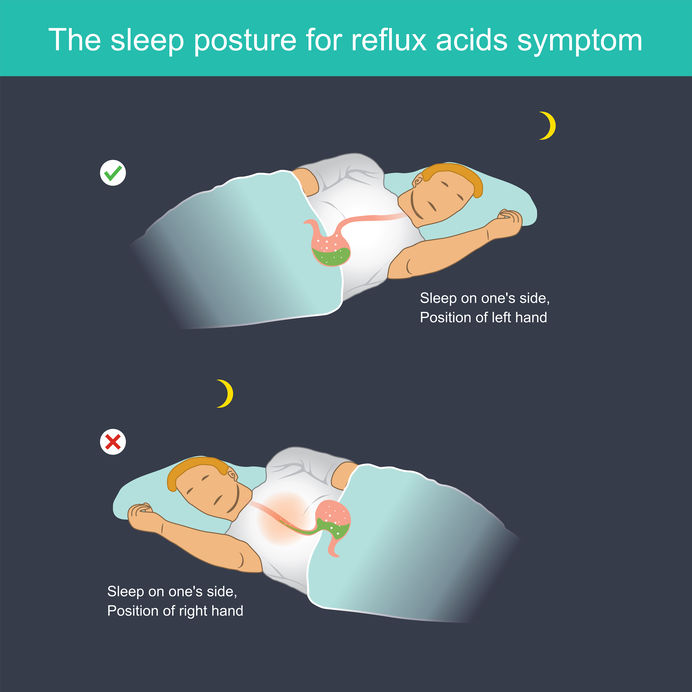Living with acid reflux can feel like an endless fight against discomfort. By making dietary and lifestyle choices, GERD and reflux sufferers can improve their symptoms and make each day more comfortable.
One of the ways to soothe acid reflux at home is by drinking tea. Before buying a cartful of tea boxes from your local grocery store, know which ones are beneficial for reflux symptoms, and which teas could make it worse.
So, what are the best teas for acid reflux? Ginger, tulsi (holy basil), and chamomile are the top three teas for relieving acid reflux. Adding honey to your tea time should also improve their reflux-friendly properties.
Does Tea Make Acid Reflux Worse?
Acid reflux can make mealtimes inconvenient. Patients often find themselves restricting their diet in order to alleviate GERD (gastroesophageal reflux disease) or acid reflux symptoms.
Learn more: What Is the Best Breakfast for Acid Reflux Sufferers?
Coffees and carbonated beverages are not advised for acid reflux because both products can further aggravate the stomach. If so, is it true that teas are the only non-water option of acid reflux sufferers?
Herbal teas may be useful in soothing stomach problems, aiding with inflammation, and improving digestion, but not all teas are beneficial to GERD patients. Certain herbal teas can actually worsen reflux symptoms because of their high acid content.
Even though it’s lower than coffee and fruit juices, the acid level found in some teas could still irritate the stomach lining and worsen stomach reflux episodes.
Bad Teas For Acid Reflux
Listed below are some of the teas that should be avoided by reflux sufferers:
- Fruit infused teas: A pot of lemon or orange infused tea might be perfect for cold winter nights, but it certainly doesn’t help reflux sufferers. The acidity content of lemon and orange could change the pH level of your tea (more so if you combine it with more acidic types of tea) and aggravate symptoms. Just like fruit juices, we would recommend staying away from fruit infused teas until your symptoms have improved.
- Mint: Whether it’s peppermint or spearmint, mint teas have developed a reputation for worsening reflux episodes. Mint teas are associated with relaxing the stomach and improving cramping. As such, it could also cause the lower esophageal sphincter (LES) to relax, leading to acid reflux.
- Teas with high caffeine content: Coffee isn’t the only breakfast drink with a high caffeine content. Black and oolong teas have about 60 to 90 mg and 50 to 75 mg of caffeine per 8 ounce cup, respectively. Definitely stay away from more caffeinated teas and choose milder versions. Otherwise, you can steep it for a shorter amount of time or simply add milk or water to dilute the tea.
Tea And Acid Reflux: Does It Help?
Some teas can make acid reflux worse. That’s not to say that drinking tea can’t help soothe acid reflux at all. Just like there are bad teas for acid reflux, there are also teas beneficial to soothing symptoms.
Specific teas are packed with antioxidants, vitamins, and inflammation properties that could improve acid reflux episodes. It’s only a matter of knowing how certain ingredients affect the digestive system, and how these can be incorporated in a patient’s everyday diet.
Best Tea For Acid Reflux

Is ginger good for acid reflux?
Ginger is one of the best home remedies for acid reflux. It’s a powerful anti-inflammatory that can help relieve gastroesophageal irritation from exposure to acids and soothe the stomach in general.
Ginger tea can also relieve nausea, which can greatly aid patients who are prone to vomiting during reflux episodes. Other benefits include improved blood circulation and stress-relief.
Among the many antioxidants it contains are phenolic compounds, which are associated with improved LES contractions. As a result, drinking ginger tea could prevent the backflow of acid altogether. It can also prove beneficial to patients who experience stomach cramps due to acid build-up.
To make ginger tea, peel some ginger, and cut it into small pieces. You can boil the ginger directly in a pot or pour it and steep it for 15 minutes. Drink a cup of ginger tea after every meal to improve reflux symptoms. Leftover ginger from steeping can be reused for another time.
Is tulsi tea good for acid reflux?
Tulsi tea is brewed using a basil herb species. Its scientific name is Ocimum sanctum and is commercially known as holy basil. Unlike basil used in foods, holy basil is commonly treated as a multi-beneficial Indian herb used to treat anything from nausea to bronchitis.
Tulsi tea can be made by steeping the leaves and flowers of the plant for 5 to 6 minutes. Although it can be added to food, we recommend taking it as a tea in order to get its full potency. Note that holy basil can be bitter and spicy, and is unlike other basil types.
Tulsi tea targets digestive problems, specifically those relating to acid reflux. It can decrease stomach acid production, increase the duration of mucus secretion, and extend the life of mucus cells — all mechanics which are useful for GERD and reflux sufferers.
As an herb, it has great anti-stress and anti-inflammation properties. Holy basil is believed to have antibacterial, antifungal, and antiviral properties, and has been used to treat mouth ulcers and other wounds.
Is chamomile tea good for acid reflux?
Chamomile tea is just as effective as a sleeping aid as it is a GERD home remedy. This type of tea is produced by steeping the flowers of plants in the Asteraceae plant family. Although no scientific evidence explains how chamomile works to soothe stomach pains, anecdotal evidence suggests that the tea is great for helping aches, cramps, and acid reflux.
Like ginger, chamomile also has anti-inflammatory properties. This natural ingredient can aid in digestive problems and is commonly prescribed to patients with diarrhea and irritable bowel syndrome. As such, it’s also another great tea to add to a reflux patient’s diet.
Chamomile tea is also said to be useful in lowering gastric acidity, which is exactly what reflux patients need. It combats hyperacidity by relaxing stomach activity, preventing the stomach from producing too much acid, which produces the reflux symptoms.
This tea is also particularly useful in lowering stress and encouraging sleep – both of which are crucial in managing reflux symptoms. As a drink, chamomile tea is pleasant and can be enjoyed throughout the day, with the exception of patients who are allergic to the drink.
Is honey good for GERD?
Honey is the choice sweetener for teas. It’s a great way to dilute stronger teas and add another depth of flavor to your favorite drink. Commonly used as a home remedy for sore throats and colds, it turns out honey is also good for GERD sufferers.
Although excess sugar and sweeteners are typically not recommended in a reflux diet, honey has natural medicinal properties that could help soothe the condition. Its ability to help during sore throats translates well into reflux episodes. When mixed in with a drink, honey can help soothe the esophagus from excessive acid exposure.
This ingredient is packed with antioxidants that will help prevent diseases. Raw, unpasteurized honey also has antibacterial and antiviral properties. Raw manuka honey is known to kill bacteria and fungus, and is considered a viable natural antiseptic by many cultures.
Its thick consistency also serves as a temporary protective barrier for the esophagus. It can coat the esophagus and provide some relief, while allowing its healing properties to soothe acid damage.
To get the benefits of honey, mix one teaspoon with a glass of warm water or add it to a glass of warm milk. Be careful not to add too much honey to your diet since this can irritate your throat if taken excessively.
How Do You Relieve Acid Reflux

Drinking a cup of tea isn’t enough to alleviate acid reflux. To see changes, consider the following treatments:
- Consider taking proton pump inhibitors
- Exercise at least three times a week
- Lose weight
- Eat dinner at an earlier time
- Take antacids before meals
- Regulate fats (oil, dairy, sugar) in your diet
- Stay away from coffee, juices, and certain teas
Improve Your Reflux Symptoms
Don’t let GERD define your life. At Gastro Center NJ, we believe that patients can still manage to live full and happy lives, even with GERD. It is our mission to help you navigate around your symptoms and find a routine that will suit your lifestyle.
Contact us today to learn more about GERD and managing symptoms. Book an appointment through our website today.
The post Top Benefits of Drinking Tea When You Suffer from Acid Reflux appeared first on Gastro Center NJ.
from Gastro Center NJ https://gastrocenternj.com/acid-reflux-tea-benefits/
via https://gastrocenternj.com

